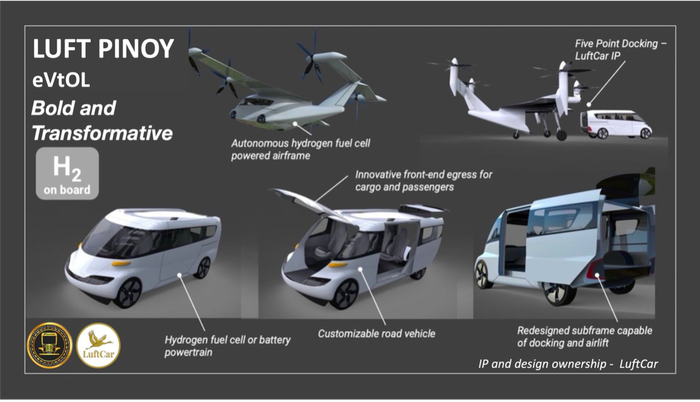Flying Car Startup Expands to Philippines; Hydrogen Powered
The LuftCar hydrogen-powered air vehicle would connect fly road vehicles created by jeepney maker eFMC

The developer of a hydrogen-powered eVTOL (electric vertical takeoff and landing) vehicle is expanding into the Philippines via a new partnership.
LuftCar in Orlando, Florida, and eFrancisco Motor Corporation (eFMC) in the Philippines, formed a strategic partnership to develop and deploy the LuftCar flying car system in the Philippines.
The LuftCar hydrogen-powered air vehicle would connect to and lift road vehicles created by eFMC, a major jeepney manufacturer.
LuftCar plans to lead the eVTOL (electric vertical takeoff and landing) vehicle prototype development and eFMC would provide the vehicle chassis.

The first application for the flying vehicle is expected to be cargo and defense, with a prototype created by the end of 2024.
The flying vehicle would be manufactured by LuftCar in Camarines Norte in the Philippines in partnership with eFMC.
“Philippines and Southeast Asia have been of great strategic importance for LuftCar,” said Santh Sathya, CEO of LuftCar. “Our flying and road vehicle concept is tailor-made for connecting the archipelagos and serving cargo, air ambulance, tourism and regional transportation verticals.
“Our hydrogen propulsion will serve long distance and heavy payload carrying needs in the region, LuftCars have a big role to play in defense in the region enabling ship to base and base to outpost missions.”
LuftCar is developing a two-seater prototype with seed funding of $1.5 million raised and aims to convert that to a five-seat commercial version following proof of concept testing.
LuftCar is taking a multi-purpose modular approach in its development.
Essentially, the flying component, called a flying forklift by the company, would attach to the land vehicle and then be able to fly it.
The appearance would be that of a car being flown by an aircraft sitting above it.
The idea is that the flying car, which appears to look more like a van, could carry parcels long distances and then deliver them by road driving to locations not accessible by air travel.
The vehicle would be capable of flight distance of 300 miles at a maximum speed of 220 mph and maximum altitude or 4,000 feet.
The land component of the overall vehicle would be capable of driving distances of 150 miles, according to the company.
The land component of the vehicle opens on the front for cargo and passengers and the airframe would be hydrogen fuel cell powered.
The target markets for LuftCar air-land vehicles are air cargo, emergency medical services (EMS), defense and national security and regional transportation.
Cargo transportation and emergency medical services are likely to be the first major use cases of certified electric aerial vehicles (EAV).
LuftCar also is developing a hydrogen fuel cell battery hybrid propulsion system for its system as well as other eVTOL platforms.
LuftCar last year received a $100 million term sheet for scaling the vehicle prototype.
The investment agreement from GEM Global Yield, a private equity group, would fund the LuftCur flying car development following the company public listing, allowing LuftCar to control the amount and timing of fund drawdowns.
Like what you've read? For more stories like this on flying cars and emerging technologies, sign up for our free daily email newsletter to stay updated!
Read more about:
Flying CarsAbout the Author
You May Also Like








